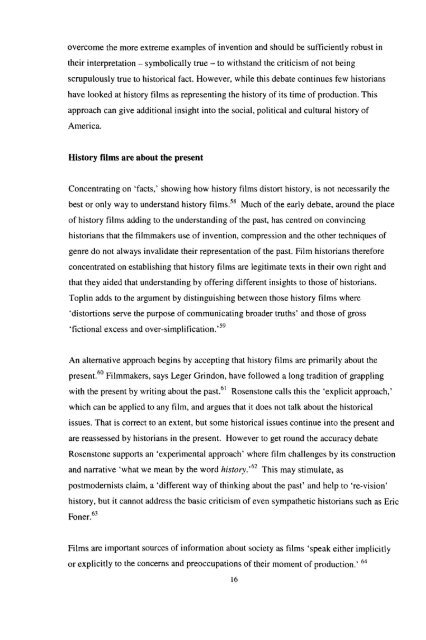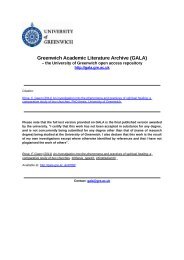Download (3483kB) - Greenwich Academic Literature Archive ...
Download (3483kB) - Greenwich Academic Literature Archive ...
Download (3483kB) - Greenwich Academic Literature Archive ...
- No tags were found...
You also want an ePaper? Increase the reach of your titles
YUMPU automatically turns print PDFs into web optimized ePapers that Google loves.
overcome the more extreme examples of invention and should be sufficiently robust intheir interpretation - symbolically true - to withstand the criticism of not beingscrupulously true to historical fact. However, while this debate continues few historianshave looked at history films as representing the history of its time of production. Thisapproach can give additional insight into the social, political and cultural history ofAmerica.History films are about the presentConcentrating on 'facts,' showing how history films distort history, is not necessarily thebest or only way to understand history films. 58 Much of the early debate, around the placeof history films adding to the understanding of the past, has centred on convincinghistorians that the filmmakers use of invention, compression and the other techniques ofgenre do not always invalidate their representation of the past. Film historians thereforeconcentrated on establishing that history films are legitimate texts in their own right andthat they aided that understanding by offering different insights to those of historians.Toplin adds to the argument by distinguishing between those history films where'distortions serve the purpose of communicating broader truths' and those of gross'fictional excess and over-simplification.' 59An alternative approach begins by accepting that history films are primarily about thepresent. 60 Filmmakers, says Leger Grindon, have followed a long tradition of grapplingwith the present by writing about the past. 61Rosenstone calls this the 'explicit approach,'which can be applied to any film, and argues that it does not talk about the historicalissues. That is correct to an extent, but some historical issues continue into the present andare reassessed by historians in the present. However to get round the accuracy debateRosenstone supports an 'experimental approach' where film challenges by its constructionand narrative 'what we mean by the word history.' 62 This may stimulate, aspostmodernists claim, a 'different way of thinking about the past' and help to 're-vision'history, but it cannot address the basic criticism of even sympathetic historians such as EricFoner. 63Films are important sources of information about society as films 'speak either implicitlyor explicitly to the concerns and preoccupations of their moment of production.' 6416
















